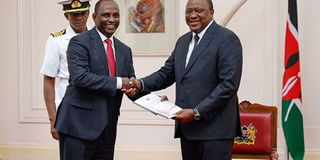This noise about census data may prove to be meaningless

Labour Cabinet Secretary Ukur Yattani (left) hands President Uhuru Kenyatta the 2019 Kenya Population and Housing Census results at State House, Nairobi, on November 4, 2019. PHOTO | PSCU
What you need to know:
- To say some census statistics were suppressed and others exaggerated without proof sounds like mere politicking.
- Many governors and their prospective successors are worried that with reduced numbers, they may not get the windfall they have enjoyed all along.
As expected, the results of the 2019 Population and Housing Census elicited reactions that ranged from outrage and humour to acceptance and vituperation, mostly from politicians who had staked their future prospects on the outcome.
Some even fumed that the figures they expected (without any scientific basis for their projections) were too removed from those reported.
However, the most annoying complaints came, not from politicians but from supposedly learned individuals on social media, casting aspersions on the integrity of the Kenya National Bureau of Statistics without interrogating the probable causes for some counties to have a higher population than expected.
To these people, for instance, there is no way Kiambu County, whose males are supposed to have failed to sire children due to over-consumption of illicit alcohol, could attain such a high count.
When it was pointed out that many towns in the county, including Kiambu itself, Ruiru, Juja and Thika, as well as highly populated suburbs like Ruaka, Kahawa and Githurai are, in fact extensions of Nairobi, whose cosmopolitan dwellers work in the capital and commute to and from their “bedrooms”, they went curiously silent.
VOTES
The same applies to the Kajiado ‘diaspora’ – Ongata Rongai, Kiserian and Ngong – which is why the county scored so high.
To say some census statistics were suppressed and others exaggerated without proof sounds like mere politicking.
There are reasons why politicians worry about the census data. The first is that numbers will determine on which counties presidential candidates will concentrate ahead of 2022.
The “tyranny of numbers” ruse seems to have worked well for the ruling party in the past, and there is no reason why it should not work just as well in future, except that Jubilee has been torn asunder by the Handshake, which has obscured the distinction between the ruling party and the opposition.
It is a very confusing state of affairs, but numbers, as always, will eventually determine who will carry the day.
Right now, the person who can galvanise the majority of ethnic-block votes to his or her side may prevail, but even then, that will depend on many other factors.
BOUNDARIES
In this country, regardless of what politicians tell us, it is always about tribes.
Never mind that a census is supposed to collect other data that would help the government do proper planning with the aim of ensuring equitable distribution of national resources.
Even more important to politicians is the revenue allocations by the national government.
Many governors and their prospective successors are worried that with reduced numbers, they may not get the windfall they have enjoyed all along.
After all, 45 per cent of such allocations is based on population size. The other reality at the heart of the unease displayed by many MPs is what follows the census: the electoral boundaries review at the constituency level next year.
JOBLESS
The politicians responsible for the din are those who will be affected when their electoral units do not meet the threshold as determined by population sizes.
At least 27 constituencies could be scrapped or merged to conform to the population size. This is bad news for MPs whose sinecures are at stake. In these days of high unemployment, this is not a comfortable thought.
But even all this may not matter until we know what is in store for the country once the contents of the Building Bridges Initiative report are revealed.
If we go parliamentary, the tyranny of numbers will not matter much, nor will county population sizes.
* * * *
For five hours on Wednesday evening, the power was off in my neighbourhood.
We called Kenya Power and were answered by an automated device which went silent as soon as you gave it your account number.
After seven tries, I gave up, because another voice said my airtime had ran out. Soon after the power was back, I saw a newspaper item in which a Mr Paul Ooko Mbaja complained about the problem.
“Kenya Power, in conjunction with telephone service providers, has found a new method of making customers lose their money. When you report a power failure though their number 95551 and follow the prompts, the prompter goes silent while still consuming your credit. Try talking to the customer care representative and you will be kept waiting. Meanwhile, your credit is being consumed. With perpetual power failures throughout the country, you can imagine how much the amount run to,” he wrote.
This seems to be a well-orchestrated scam to bilk power consumers of their money, which means some people must be making a tidy sum. Someone with KP and the Telco is either complicit or sleeping on the job.
Mr Ngwiri is a consultant editor ([email protected])





